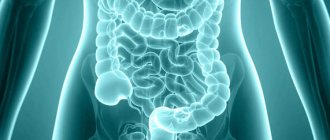The body of the expectant mother undergoes changes from the first months of pregnancy, which is a completely natural physiological process. Such a restructuring presents a woman with unpleasant surprises. During the period when the body tries to adapt to conditions that are comfortable for the baby, the expectant mother begins to experience problems with the gastrointestinal tract.
Digestion during pregnancy slows down, cramps in the stomach and excessive gas formation appear. The expectant mother also complains of bloating and rumbling in her stomach. The listed symptoms appear when there is dysfunction of the digestive tract. How can you cope with flatulence without harming your baby? Is bloating during early pregnancy harmful to the body or not?
Morning sickness, vomiting and general malaise during pregnancy
Morning sickness and morning sickness are common during early pregnancy as the body undergoes important changes necessary for the development of the baby.
up to 90% of women experience nausea during pregnancy
Doctors find it difficult to say with certainty why pregnant women feel sick in the morning. The main theory is hormonal changes. But there are some patterns associated with an increased risk of morning sickness:
- Multiple pregnancy;
- Toxicosis during a previous pregnancy;
- History of morning sickness during pregnancy in close relatives;
- Tendency to motion sickness in transport;
- Use of oral contraceptives containing estrogen before pregnancy;
- Frequent migraines;
- Body mass index 30 or higher;
- Increased levels of stress hormones
Risks of severe toxicosis and how to reduce nausea
Typically, nausea and vomiting are not associated with a risk to mother and baby and will subside by 16–20 weeks of pregnancy, but you don't have to wait that long—there are ways you can help reduce nausea and enjoy the process of waiting for your new one more:
- Get plenty of rest - fatigue increases toxicosis;
- Avoid smells and foods that cause nausea;
- Eat something immediately after waking up. Toast or a piece of bread will help reduce nausea;
- Avoid hunger - an empty stomach makes nausea worse. Eat small meals often, give preference to low-fat, high-carbohydrate foods;
- Try ginger - research shows it helps fight nausea;
- Drink small sips as often as possible and give preference to still water.
In rare cases, pregnant women may develop hyperemesis gravidarum or excessive vomiting. This is a serious condition that can lead to dehydration, kidney problems, seizures, heart rhythm problems and even death.
Signs of dehydration include dry mouth, dizziness, dark-colored urine, infrequent urination, and/or dizziness.
Symptoms of excessive vomiting during pregnancy:
- frequent nausea for a long time and regular vomiting after eating;
- dry skin and lips;
- sudden weight loss;
- low blood pressure (below 90/60).
If you experience symptoms of excessive vomiting during pregnancy, you should not wait until the condition goes away on its own. It is necessary to seek medical help as soon as possible - the doctor will prescribe treatment and help adjust the diet and lifestyle of the expectant mother. 0.5–2%
pregnant women experiencing excessive vomiting
Causes of flatulence
The main reasons due to which flatulence occurs during pregnancy include the following.
Hormonal changes and bloating
In the first months of pregnancy, a woman’s progesterone concentration levels begin to actively increase. The hormone is inextricably linked with the functioning of smooth muscle. In order to ensure normal gestation, the uterus is constantly relaxed.
When hypertension occurs, the risk of spontaneous abortion increases. The relaxation that progesterone has extends to the area of smooth intestinal muscles. As a result, an obstacle arises to the correct release of the resulting gas mass.
Poor nutrition
In the first months of pregnancy, the eating behavior of the expectant mother changes beyond recognition. Very often a woman begins to eat absolutely wrong and incompatible foods. For example, eat pickles with jam or eat a hamburger with condensed milk. It is quite natural that after such a diet problems arise in the functioning of the intestines.
Digestive enzymes and bloating
Quite often, pregnant women experience a deficiency of enzymes that are responsible for the proper process of digesting food. An imbalance may occur due to an improper diet or hormonal imbalance. A strict diet and hormone fluctuations provoke a malfunction in the functioning of the pancreas.
As a result, the organ loses the ability to produce beneficial digestive enzymes. Improperly digested food mass penetrates the large intestine and provokes excessive gas formation. In cases where flatulence bothered a woman even before pregnancy, we can talk about an exacerbation of the malaise during the period of bearing the baby.
Bloating due to stress
Excessive amounts of negative emotions have a negative impact on women's health. After prolonged stress, the expectant mother’s general health deteriorates and the digestion process is disrupted. To overcome flatulence, in this situation it will be enough to tune in to the positive and find reasons to smile more often.
Important! In order to eliminate the unpleasant symptoms of flatulence, you need to adhere to proper nutrition and exercise. In some cases, you may need a course of treatment with special anti-flatulence drugs, which are absolutely safe for the baby.
Violation of the digestive process leads to disruption of the development of the child inside the womb
Diarrhea during pregnancy
The word "diarrhea" comes from the Greek and literally means "to flow through." This is a condition during which bowel movements or bowel movements occur three times a day or more often. This phenomenon is especially characteristic of the third trimester of pregnancy, but can also occur at earlier stages.
Symptoms of diarrhea:
- Three or more bowel movements per day
- An urgent urge to have a bowel movement
- Abdominal pain and cramps
- Bloating
Causes of diarrhea during pregnancy
In everyday life and during pregnancy, the causes of diarrhea are similar: it can be excessive consumption of certain foods, medications, food poisoning, dysbacteriosis, bacterial and viral infections:
| Gastroenteritis | Consuming lactose and gluten if you are intolerant to these nutrients |
| Bacterial infections: listeriosis or salmonella | Chronic gastrointestinal diseases: Crohn's disease, IBS, ulcerative colitis |
| Some antibiotics and antacids to reduce acidity | Laxatives |
| Sugar substitutes such as sorbitol | Excessive consumption of certain foods |
Tip: If you have recently returned from a vacation in an exotic country with nausea and diarrhea and find out that you are pregnant, contact your doctor as soon as possible.
Gastroenteritis
One common cause of diarrhea during pregnancy is gastroenteritis or stomach flu. It is caused by bacterial or viral infections: norovirus, rotavirus, E. coli, salmonella, which enter the body through contact with contaminated surfaces, dishes, food and water.
Gastroenteritis usually lasts about three days. However, severe disease is dangerous to health, especially during pregnancy, as it can cause dehydration, electrolyte imbalance, and lead to premature birth.
The main symptoms of gastroenteritis include diarrhea without blood, nausea and vomiting, stomach cramps and pain, low-grade fever, headache and muscle pain.
Increased precautions will help reduce the risk of illness: frequent hand washing and disinfecting surfaces. If the expectant mother has small children, they are not recommended to use the same cutlery.
Risks of diarrhea during pregnancy
Typically, diarrhea during pregnancy is not a cause for concern. However, you should consult a doctor if you experience the following symptoms during this period:
- Diarrhea for more than two days;
- Stool with blood or mucus;
- Sudden weight loss;
- Stomach ache;
- Dehydration.
How to treat diarrhea during pregnancy
If you experience diarrhea during pregnancy, drink plenty of fluids, avoid foods high in fat and sugar, and avoid dairy products and caffeinated drinks.
Dehydration is a serious risk, especially during pregnancy, so the first step is to restore electrolyte balance with fluids and simple foods:
| Fruit juices in moderation | Drinks without alcohol and caffeine |
| Bananas | Potato |
| Rice | Toasts |
| Crackers | Light soups and broths |
| Pasta | Applesauce |
Find out about your body's ability to break down lactose and gluten using the Atlas Microbiota Test.
Breast changes: tingling, pain, growth
The period when breasts begin to grow during pregnancy occurs at 4-6 weeks. At this time, due to changes in hormonal levels, a woman may feel tingling, she may get the impression that her breasts have become heavier or larger, swelling has appeared, and sensitivity has increased.
These sensations during early pregnancy go away as soon as the body adapts to the new level of hormones.
By week 11, visual changes may become noticeable: an increase in breast size, enlargement and darkening of the areola (the area around the nipple).
Clue
- Don't be afraid of changes. To make it more comfortable, you can use breast care creams during pregnancy.
- Choose 1-2 comfortable bras. Cotton models with adjustable volume, without wires and lace inserts are very comfortable. They can be worn throughout the entire period of pregnancy and lactation.
- Use breast pads, such as bamboo ones. They are inserted into cups and reduce friction between underwear and skin.
Stomach pain and heartburn during pregnancy
During pregnancy, many women experience pain in the stomach, especially the upper part, as well as heartburn - a burning sensation in the chest and esophagus.
This is most often observed in the third trimester, after approximately 27 weeks. This is an unpleasant but natural phenomenon during pregnancy: the baby grows inside the uterus and puts pressure on other organs, including the stomach. And hormones cause the muscles to relax, which causes acid from the stomach to enter the esophagus and irritate it. In addition, pain can be caused by problems with certain organs such as the gallbladder, or inflammation of the pancreas.
Symptoms of heartburn during pregnancy:
- Burning in chest and esophagus;
- Feelings of overeating, heaviness, or bloating;
- Belching, including acid and/or food particles;
- Nausea.
It is unlikely that you will be able to avoid cramps and heartburn during pregnancy. However, some tips can help reduce their frequency:
Nutrition
: try to avoid overeating - eat easily digestible food in small portions; do not eat three hours before bedtime; Watch your posture while eating - this way there will be less pressure on your stomach.
7 Healthy and Simple Habits for Gut Health
Smoking and alcohol: In addition to being known to be harmful to mother and baby, tobacco smoke also relaxes the muscles in the lower esophagus, allowing acid to enter the esophagus. And alcohol provokes heartburn and acid reflux.
Although stomach pain and heartburn often accompany pregnancy, abdominal pain, especially in the third trimester, should be taken seriously. This may be a sign of preterm labor or placental abruption, and puts mother and baby at risk.
If you experience severe abdominal pain accompanied by the following symptoms during pregnancy, seek medical help as soon as possible:
| Abdominal pain and fever | Bleeding |
| Regular seizures | Unusual vaginal discharge/spotting |
| Vomit | Lower back pain |
| Painful sensation or burning sensation when urinating | Severe pain that lasts 30–60 minutes |
Survey
The appearance of belching during pregnancy often indicates a specific gestational pathology or exacerbation of a chronic gastrointestinal disease against the background of hormonal changes. The examination is prescribed by a gastroenterologist with the obligatory participation of an obstetrician-gynecologist in making a diagnosis and selecting therapy. All patients are required to undergo a comprehensive examination using laboratory and instrumental methods that do not pose a danger to either the mother or the fetus. For diagnostic purposes the following are used:
- Ultrasonography
. Ultrasound of the abdominal cavity is the main instrumental diagnostic method, since this study is absolutely harmless to the child. Sonography allows you to identify signs of inflammatory processes and morphological changes in the gastrointestinal tract. The study is not informative enough in late pregnancy due to significant enlargement of the uterus. - Intragastric pH-metry
. The occurrence of acid belching during gestation usually occurs against the background of disturbances in the secretion of hydrochloric acid, therefore 24-hour measurement of acidity levels in the stomach is recommended. Additionally, pH measurements of the esophagus are performed - a decrease in the level to less than 4 indicates gastroesophageal reflux. - Breath test
. To exclude gastrointestinal pathology due to H. Pylori infection, a non-invasive respiratory test is prescribed, based on the ability of the bacterium to break down urea in the stomach. The method sometimes gives false negative results, so to clarify the diagnosis, a specific fecal antigen in the blood is additionally determined. - Laboratory blood tests
. All patients are shown a standard biochemical blood test, which can detect signs of protein-energy deficiency and detect problems in the functioning of the hepatobiliary system. According to indications, it is recommended to study blood plasma for the level of gastrin and pepsinogen, and determine the main hormones. - Endoscopy
. Endoscopy is used during gestation according to strict indications, in cases where belching is accompanied by other dyspeptic disorders. The study allows you to examine the mucous membrane of the esophagus and stomach, and visualize inflammatory foci. The endoscopic method is highly informative in assessing the contractile function of muscle sphincters.
The list of mandatory examination methods also includes a coprogram that detects specific changes in feces due to inflammation, fermentopathy, maldigestion and malabsorption, an analysis for helminth eggs, and Gregersen’s reaction to occult blood. If inflammatory bowel disease is suspected, pregnant women undergo sigmoidoscopy and colonoscopy with extreme caution.
During pregnancy, you need to reconsider your diet
Bloating, constipation and microbiota during pregnancy
Excessive gas and constipation during pregnancy can be caused by hormonal changes, such as increased production of progesterone. This hormone, essential for nourishing the uterus and embryo, relaxes the muscles of the body, including the intestinal muscles, which slows digestion and increases flatulence. A similar reaction of the body can be observed before each menstruation, when the production of progesterone increases.
7 Foods That Cause Increased Gas and Bloating
Flatulence is bloating due to the accumulation of gases.
Here are a few simple rules that will help improve intestinal motility and avoid constipation and bloating:
- If you don't usually eat a lot of fiber and difficult-to-digest foods like legumes, try to gradually introduce them into your diet;
- Do not abuse carbonated drinks and fatty foods;
- Move more;
- Drink more fluids.
If bloating and constipation are accompanied by severe pain that lasts more than 30 minutes, or if you have been constipated for two or more weeks, consult your doctor.
Microbiota and gut bacteria during pregnancy
During pregnancy, a woman's body goes through many changes, and this can affect the microbiota - the ecosystem of bacteria living in the intestines. Trillions of microorganisms perform important work for the whole body: they synthesize vitamins and important acids, support the functioning of your intestines and protect it from disease and inflammation.
The additional influx of female hormones that accompanies pregnancy changes intestinal function and affects the microbiota. This is good because the bacterial community is constantly adjusting to external and internal conditions to keep up with the body's needs.
In order for your gut bacteria to continue to keep your digestion running smoothly, they need your help. Provide them with healthy foods and plant fibers. Fruits, vegetables, whole grains, nuts and seeds contain prebiotics - special substances that feed beneficial bacteria. When properly balanced, the bacteria even increase your body's defenses against harmful microorganisms that can cause gastroenteritis during pregnancy.
What foods contain fiber?
The Atlas microbiota test will help you understand how to prepare your gut for future pregnancy and reduce the risk of digestive problems.
Breast tenderness
Pain and tension in the mammary glands are one of the earliest signs of pregnancy, so this phenomenon in the first trimester should be regarded as normal. The mammary glands undergo a real hormonal revolution, actively preparing for further feeding of the baby. This may last for the first 3-4 months after conception.
To feel more comfortable, choose a looser bra size or purchase special supportive underwear. You can return to exquisite lace bras with underwire immediately after lactation ends.
We adjust physical activity and regimen:
- It is necessary to organize the correct daily routine , in which night rest should be at least 9-10 hours, a couple of daytime rest breaks of half an hour, when the expectant mother can simply lie down with her legs elevated.
- Particular attention should be paid to sufficient physical activity of the pregnant woman so that the intestines work well. These include walks in the fresh air, and feasible exercises of special gymnastics for pregnant women , and breathing exercises every day.
- Shoes and clothing should be comfortable , not tight, and appropriate for the duration of pregnancy. No corsets or high heels!
- After eating, it is very useful to massage the abdomen , stroking it around the navel clockwise. Do not press under any circumstances!
- Swimming and water aerobics for pregnant women.
Discharge
At the beginning of pregnancy, you may notice a slight milky-white vaginal discharge - leukorrhea or, popularly known as leukorrhea.
Use panty liners (not deodorized) as hygiene products The use of tampons during pregnancy is excluded - they provide your genital tract with a favorable environment for the growth and development of pathogenic microorganisms, increasing the risk of infection.
Leucorrhoea in the first trimester is an absolutely normal and reasonable phenomenon, but if you notice greenish or yellow discharge with a characteristic pungent odor, be sure to notify our specialist about it.
Alarming symptoms
- Bleeding from the genital tract that occurs in pregnant women is not normal in any case. Statistics say: about 25% of all women suffer from uterine bleeding of unknown origin during pregnancy. Almost each of them requires hospitalization for medicinal prolongation of pregnancy and preventive measures against spontaneous abortion.
Bloody discharge in the first trimester of pregnancy may indicate the following disorders:
- Incipient miscarriage;
- Ectopic pregnancy (a process in which the embryo develops outside the uterine cavity, most often in the fallopian tube);
- Bubble drift.
Less common are bleeding due to abnormalities of the blood coagulation system : for example, von Willibrand's disease, thrombocytopenic purpura. An almost exceptional case is embryo self-reduction (the phenomenon in which one or more embryos self-dissolve in a multiple pregnancy). This case is not always accompanied by the appearance of bloody discharge.
- Pain in the lower abdomen;
- Severe dizziness and fainting;
- Rapid weight gain or loss
- Vomiting more than 3-5 times a day.
Be prudent and do not plunge into despair at the first change in your body. If you find yourself with at least one of the listed signs, immediately contact our specialist! Any of these symptoms may indicate the development of obstetric pathology. We will do our best to make your pregnancy easy, smooth and healthy.











